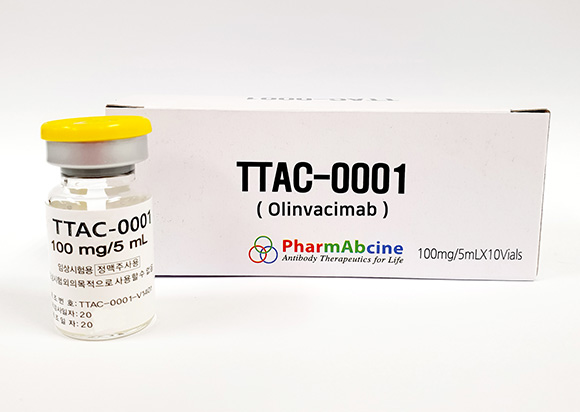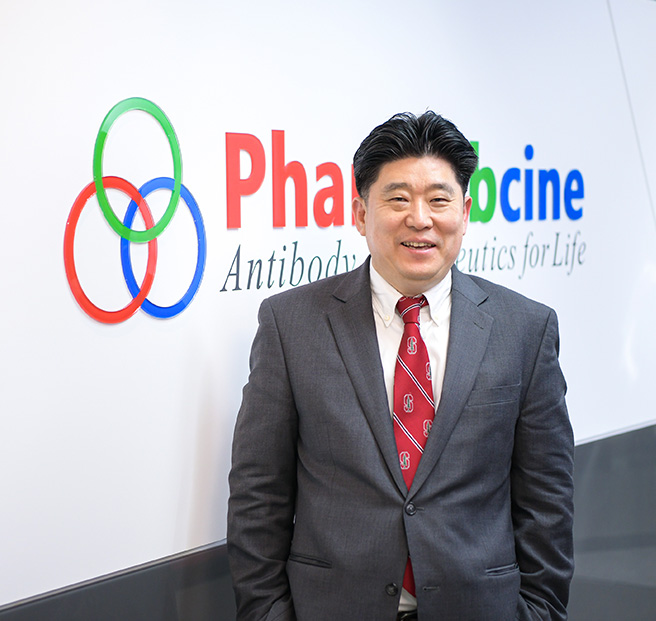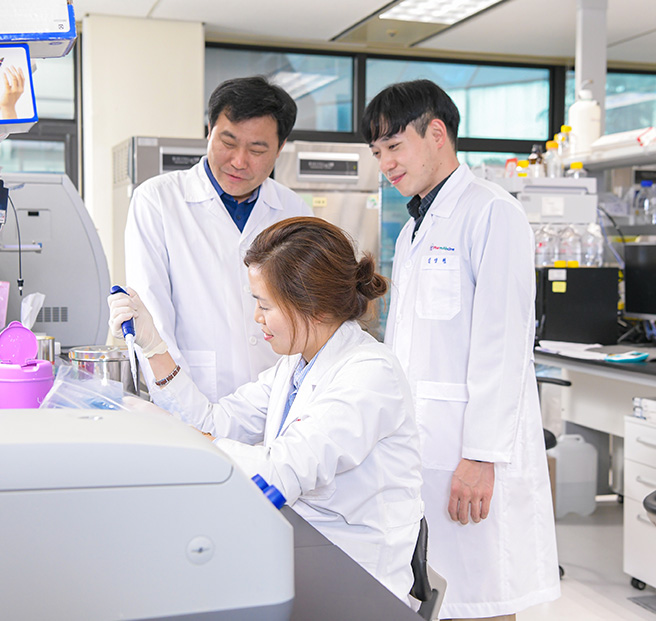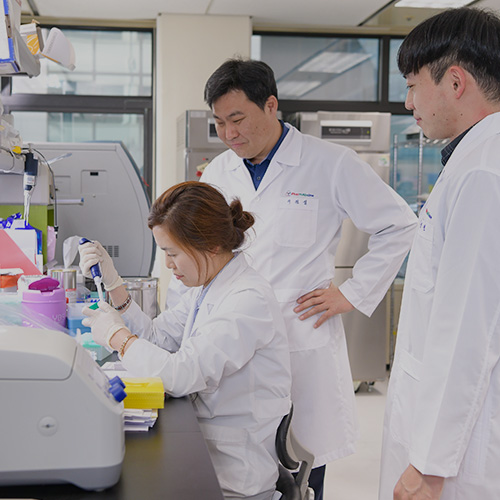Developer of Next-Generation Antibody Therapeutics
PharmAbcine

The prevalence of cancer has been on the rise due to a variety of reasons, including population aging and environmental factors. Meanwhile, cancer death rates have been declining steadily thanks to the advances in medical technology and the development of therapeutic agents. The conventional drugs used in chemotherapy were cytotoxic anti-cancer agents and targeted therapies, but the recent trends in the oncology field are related to either immune boosters or tumor angiogenesis inhibitors. Headquartered in Daejeon, PharmAbcine is a biotech company established in 2008 that has been developing antibody therapeutics for neovascular diseases, cancer, and various indications using its own antibody library. Dr. Jin-San Yoo, CEO of PharmAbcine, is an expert in the field of antibody therapy with research and development (R&D) experience in Korea and abroad. The company is currently in the spotlight for developing diverse candidates related to antibodies that target Tie2 for vascular normalization as well as olinvacimab, a tumor angiogenesis inhibitor currently in the clinical stage.
Olinvacimab, Anticancer Antibody Drug Under Clinical Trial
Olinvacimab, one of the main pipelines of PharmAbcine, is a therapeutic agent that inhibits tumor growth and metastasis by inhibiting tumor angiogenesis. To explain, cancer cells send a signal for angiogenesis via vascular endothelial growth factor (VEGF) in order to receive nutrients necessary for growth. Olinvacimab inhibits tumor angiogenesis by binding to VEGFR2, a receptor for the signaling protein, and neutralizes the signaling system. Without any blood vessels, tumors are unable to receive nutrients for growth and thus eventually die. A Phase 2 clinical trial is currently underway in the United States and Australia for patients suffering from recurrent brain tumors after treatment with bevacizumab. Also, two Phase 1b studies in recurrent brain tumor patients and metastatic triple-negative breast cancer (mTNBC) patients are ongoing in combination with KEYTRUDA® (pembrolizumab), a PD-1 antibody from global pharmaceutical company, Merck Sharp & Dohme Corp. No safety issues were found in the Phase 1b clinical trials. The clinical trial carried out with triple-negative breast cancer patients, in particular, showed an encouraging interim data with 50% objective response rate (ORR) and 67% disease control rate (DCR). Based on this result, the companies agreed to enter a Phase 2 mTNBC clinical trial in mTNBC. In September 2021, PharmAbcine received Human Research Ethics Committee (HREC) clearance for the combo study in mTNBC and expects first patient recruitment in October 2021.
Tie2-Targeting Antibody for Vascular Normalization
In addition to olinvacimab, PharmAbcine is preparing for global clinical trials for three novel drug candidates, PMC-403, PMC-402, and PMC-309. PMC-403, one of the new pipelines of the company, is expected to be effective for not only vascular diseases, such as age-related macular degeneration and diabetic retinopathy, but also various kidney diseases and acute respiratory distress syndrome (ARDS). According to the non-clinical data presented by the company at an ARVO annual meeting, the world’s largest ophthalmological conference, PMC-403 not only showed similar vascular leakage inhibition to Eylea, the best-selling drug in the eye disease market, but also demonstrated higher improvements in optic nerve response rates, thus proving its potential. Currently, PMC-403 is undergoing GLP-Tox studies to evaluate its safety, and a global Phase 1 clinical trial is scheduled to proceed in late 2022.
PMC-402 is the same vessel-normalizing antibody like PMC-403, but it is being developed as an anti-cancer drug. New blood vessels created by cancer cells to obtain nutrients are usually abnormal with holes in the walls and poorly connected with other blood vessels. PMC-402 normalizes these pathological blood vessels, thereby allowing anti-cancer drugs and immune cells to get to cancer cells more successfully. These characteristics of PMC-402 are expected to maximize the anti-cancer effect when administered in combination with other immuno-oncology agents, so it is being developed for a combo therapy. PMC-402 is also being tested for toxicity, and a clinical trial is expected to commence in the middle of 2022.
PMC-309 is an immune check point inhibitor (ICI) that activates immune cells in the body. It targets V-domain immunoglobulin suppressor of T cell activation (VISTA) receptors which are mainly expressed on Myeloid-derived suppressor cells (MDSCs). MDSCs are known for suppressing immune activities of T cells and inhibiting MDSCs would result in immune activities of T cells. This mechanism is different from that of existing immunotherapy drugs that directly activate T cells, so it can be used in both mono and combo for patients who show low response rates or have developed resistance to existing drugs. According to the non-clinical data presented by PharmAbcine at the American Association for Cancer Research (AACR) Annual Meeting in April this year, PMC-309 showed significantly improved anti-cancer effect when used in combination a PD-1 drug, thus proving its potential for use in immuno-oncology. Toxicity studies for PMC-309 commenced in April this year, and a global Phase 1 clinical trial is expected in 2022.
Establishment of U.S Subsidiary to Expand into Other Fields
Following its initial public offering (IPO) in 2018, PharmAbcine founded Wincal Biopharm in San Francisco, USA. Wincal Biopharm was established to expand PharmAbcine’s portfolio in non-oncology indications, and both companies entered into a licensing agreement in April 2020. This agreement will allow Wincal to utilize PharmAbcine’s existing pipelines for the development of drugs in neovascular and non-oncology fields.
PharmAbcine is diversifying its portfolio with the addition of new drug candidates inhibiting tumor angiogenesis, followed by non-oncology vascular therapeutics and immuno-oncology candidates. The immuno-oncology candidates, in particular, can be used in combination with new drug candidates that inhibit tumor angiogenesis, which will help strengthen their competitiveness on the market. Moreover, the experience and know-how gained by the staff, while carrying out clinical trials with internationally recognized medical professionals, will contribute to the company’s pipeline development in the future.
PharmAbcine is striving to become a global biotech company that contributes to humanity by restoring people’s health. To this end, the company is continually fortifying its pipelines and discovering new candidates to emerge as an innovative leader in new drug development.
* For news and information on PharmAbcine, check out the following links:





 Specialized Medical Service
Specialized Medical Service
 Bio Technology
Bio Technology
 Health & Wellness
Health & Wellness
 City & Culture
City & Culture
 Hot Issue
Hot Issue
 Interview With
Interview With
 Medical Technology
Medical Technology
 City & Culture
City & Culture
 Food & Travel
Food & Travel
 Health & Wellness Tips
Health & Wellness Tips
 Hot Issue
Hot Issue